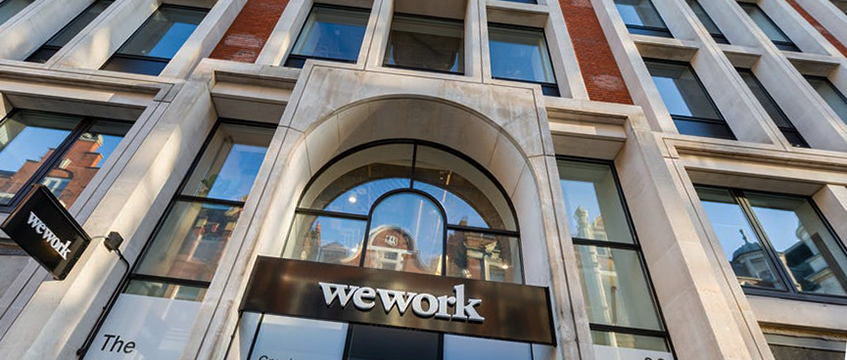As troubles mount for WeWork, rivals of the company that was once the poster child for co-working are eyeing potential opportunities to take over its flexible offices.
The New York-listed company is upping an “intense focus” on rent and tenancy expenses, it told investors in a second-quarter update last week, having exited or amended 590 leases since the final months of 2019. Its losses so far this year are already so severe that the company said there is “substantial doubt” over its ability to stay in business. As one agency professional put it: “The house of cards is falling down.”
Now, other operators in the UK are starting to think about which jewels in WeWork’s portfolio might shine more brightly under another brand. Industry players canvassed by EG mentioned names including x+why, Industrious, Orega and IWG as likely to be eyeing buildings that WeWork could vacate.
“There are a growing number of flex operators that operate solely via management agreements and are no doubt in talks with a number of landlords,” said one flex industry analyst.
Rival operators and advisers in the flex space pointed to WeWork sites in London that will be hot property if they come up for grabs. WeWork Waterloo, said to be the largest co-working space in the world, “is one that every provider will want to take over should it become available”, said one.
Others highlighted City of London properties Devonshire Square, EC2, 2 Minster Court, EC3, and Moor Place at 1 Fore Street Avenue, EC2, along with 1 St Katharine’s Way, E1, near Tower Bridge, as likely to attract interest if WeWork were to release space. According to Nomad Living, which claims to run “the world’s first WeWork ranking” of offices, the most popular in London are 10 York Road, SE1, 5 Merchant Square, W2, and The Monument at 51 Eastcheap, EC3.
Rivals with an eye to recycle the company’s former premises and rebrand them as their own will be vying to convince WeWork landlords that they are the most qualified to take on empty space if WeWork’s troubles worsen.
At IWG, partnership sales manager Steve Rose posted a message on social media for “former and current WeWork landlords”, noting that the company has “already successfully converted circa 50 former WeWork buildings” into profitable offices under brands including IWG, Regus and Spaces. “Bring your building onto our platform now,” he added, in capital letters.
Caleb Parker, founder of Bold, posted a story about WeWork’s troubles and added: “If you’re an investor or landlord with keys returned to you it’s not all bad news… Your fully fitted floors may still have demand with a different brand in your market.”
He said: “The hard truth [is] you won’t get a lease on [WeWork] terms. That didn’t work. The good news is, a management agreement that puts you in control can be less risky. And if you don’t have a line of 10,000+ sq ft “tenants” at the door – send me a DM.”
Some industry figures spoke of WeWork’s woes with sadness. One described the company as a “trailblazer”. The chief executive of a London-focused co-working operator said the sector owed much of its current success to WeWork, even if the writing now appears to be on the wall.
“The whole industry should be thankful to them,” he said. “They spent millions on marketing and showed that there was something different possible in the office market.”
But that legacy seems unlikely to ensure the continuation of the dynasty and stave off the company’s risk of collapse. The same chief executive added: “Every broker I know is calling every client they put into a WeWork space and asking: ‘Do you want to move?’”
To send feedback, e-mail tim.burke@eg.co.uk or chante.bohitige@eg.co.uk, or tweet @_tim_burke, @bohitige or @EGPropertyNews











